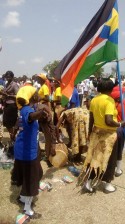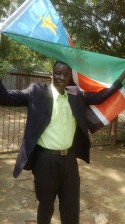Reflections on Independence in South Sudan

Last month, South Sudan celebrated its day of independence, marking the third year since the inception of the world’s newest country. Celebration, however, was undoubtedly muted for the many people who have been displaced from their homes or have lost loved ones in the conflict that has wracked the country for the past nine months.
This conflict has been drawn along political lines between those supporting current president, Salva Kiir, and the forces supporting his ex-deputy, Riek Machar. These lines are also influenced and compounded by the fact that they belong to different tribes, though the Dinka and Nuer peoples have mixed affiliations and views of these leaders. Moreover, sometimes the choice of which side to take is motivated by opposition to the rival leader, rather than affirmative support for their own faction.
Attempts to reconcile the underlying conflict between these parties have not clearly progressed. A ceasefire treaty was signed in January, but was quickly broken. Another was signed in May, shortly after U.S. Secretary of State John Kerry met with President Kiir. Another treaty was reported to have been signed again last week, but Machar’s rebel forces deny that they were part to the negotiations. Days after the putative negotiations, a U.N. helicopter was shot down, killing the three crew members aboard; government forces accused rebels, while rebel forces denied the charges as “baseless.”
It is hard for those who hope for South Sudan to flourish not to be discouraged by these facts, yet the string of broken ceasefires need not signal a lack of progress. Rather, the process may be a slow one, requiring time and struggle to rebuild the country, create an autonomous, independent existence, shape its identity in the years ahead, and secure just foundations for its government institutions and political system.
Thus, rather than becoming disheartened by the current conflict–though still hoping for it to end–it is worth remembering the intricacies and complexities behind the motivations of many perpetuating the fighting. Though it may be appropriate to consider the violence “senseless” because disagreements could be hammered out with pen, paper, and frank discussion rather than warfare and bloodshed, we should be wary of conflating senselessness with irrationality. Questions about majoritarian representation, persistent minorities, access to resources, proper resolution to past injustices, and other issues undergird the fundamental disagreements between warring parties. And a resolution of such deeply entrenched problems, as has been borne out in the histories of numerous other countries, is anything but easy if it is to be lasting and meaningful.
You can learn more about how Rebuild South Sudan is allocating resources to meet the needs of the South Sudanese people in the way we believe to be most effective by reading about our Sustainable Supplies Campaign.







